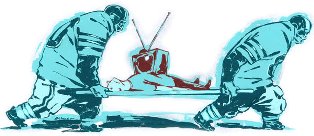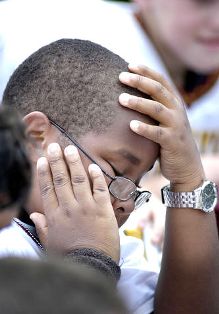October 9th, 2011 by ChristopherChangMD in Research
No Comments »

 In one of the stranger research projects I’ve encountered in awhile, French scientists reported on why in the sport of discus throwing, athletes tend to feel more dizzy than those who hammer throw.
In one of the stranger research projects I’ve encountered in awhile, French scientists reported on why in the sport of discus throwing, athletes tend to feel more dizzy than those who hammer throw.
Whether discus or hammer throwing, both require spinning on part of the athlete before letting the discus/hammer go for long distances.
59% report dizziness with discus throwing, but none with hammer throwing. Why?
This occurred even among athletes who did both sports eliminating individual susceptibilities to dizziness.
Based on slow-motion video analysis, it was conjectured that Read more »
*This blog post was originally published at Fauquier ENT Blog*
September 30th, 2011 by ChristopherChangMD in Research
No Comments »

 Researchers at Johns Hopkins published a study that reports that MRI scans CAN cause feelings of dizziness induced by magnetic fields causing motion of the electrically charged fluid of the inner ear.
Researchers at Johns Hopkins published a study that reports that MRI scans CAN cause feelings of dizziness induced by magnetic fields causing motion of the electrically charged fluid of the inner ear.
In both ears, there is a “gyroscope” called the labyrinth. Whenever the head turns or a force like gravity is exerted on this system, fluid moves within, which tells the brain that motion has occurred. It’s much like looking into a glass of water and based on the way the water tilts in the glass, you can guess which way motion is occurring.
In any case, the study Read more »
*This blog post was originally published at Fauquier ENT Blog*
September 7th, 2011 by ChristopherChangMD in Research
No Comments »

 So how would one go about figuring out the best medication for dizziness due to motion-sickness leading to nausea and even vomiting?
So how would one go about figuring out the best medication for dizziness due to motion-sickness leading to nausea and even vomiting?
Well, step 1… Put a bunch of people in a machine and figure out the necessary motions that will cause dizziness.
Step 2… Do the same thing, but this time, put people on different medications and figure out what works the best.
Sound crazy?
Well it has been done by the friendly folks at NASA. Read more »
*This blog post was originally published at Fauquier ENT Blog*
February 6th, 2011 by Dinah Miller, M.D. in Health Tips, Humor
No Comments »


 So it’s Super Bowl Sunday and the fans are psychiatric patients waiting to happen — the beer and the beer and the beer, and maybe the fights will break out, and they’ll all end up in therapy. Oh, the angst and the panic, and the pre-game anxiety, and the post-game euphoria or depression.
So it’s Super Bowl Sunday and the fans are psychiatric patients waiting to happen — the beer and the beer and the beer, and maybe the fights will break out, and they’ll all end up in therapy. Oh, the angst and the panic, and the pre-game anxiety, and the post-game euphoria or depression.
New York Times reporter Benedict Carey talks about treatment options in his article, “A Home Treatment Kit for Super Bowl Suffering.” Mr. Carey suggests:
Breathing exercises are highly recommended and become increasingly important as the football contest nears the fourth quarter, when events on the field are likely to prompt strong physiological reactions, like a pounding heart, hyperventilation, even dizziness. These internal cues, as they’re called, can escalate the feeling of panic, a self-reinforcing cycle resulting in groans and cries that can be frightening to small children, pets and sometimes neighbors.
In the final minutes of the game, be forewarned: Many patients will move beyond the reach of therapy. Their faces may change, their breathing appear to stop. Researchers have not determined whether this state is closer to Buddhist meditation or to the experience of freefall from an airplane. All that is known is that, once in it, patients will fall back on primal coping methods, behaviors learned in childhood within the cultural context of their family.
Like emitting screams. Or leaping in an animated way, as if the floor were on fire. Or falling on their back and moving their arms and legs like an overturned beetle, in celebratory fashion.
This post is dedicated to my husband and son.
*This blog post was originally published at Shrink Rap*
September 2nd, 2010 by Michael Sevilla, M.D. in Better Health Network, Health Policy, Health Tips, News, Research
1 Comment »

 A study published earlier this week by the American Academy of Pediatrics states that “the number of sport-related concussions is highest in high school-aged athletes, but the number in younger athletes is significant and on the rise.” Why is this? Many believe this is from better recognition of the symptoms and the need to be medically evaluated.
A study published earlier this week by the American Academy of Pediatrics states that “the number of sport-related concussions is highest in high school-aged athletes, but the number in younger athletes is significant and on the rise.” Why is this? Many believe this is from better recognition of the symptoms and the need to be medically evaluated.
I did a couple of interviews with local TV news to talk about the subject (Video 1 and Video 2). In my research on this subject, I found an article from the Dayton Daily News stating that the Ohio High School Athletic Association (OHSAA) passed a policy in May 2010:
Any athlete who exhibits signs, symptoms or behaviors consistent with a concussion (such as loss of consciousness, headache, dizziness, confusion or balance problems) shall be immediately removed from the contest and shall not return to play until cleared with written authorization by an appropriate health care professional.
In addition, on the OHSAA website there’s an entire section devoted to concussions and head injuries. I have also read that other states have taken similar steps, especially with high school and younger athletes.
If you find the videos in this post helpful, I encourage you to see my other interviews on health-related topics at MikeSevilla.TV
*This blog post was originally published at Doctor Anonymous*
 In one of the stranger research projects I’ve encountered in awhile, French scientists reported on why in the sport of discus throwing, athletes tend to feel more dizzy than those who hammer throw.
In one of the stranger research projects I’ve encountered in awhile, French scientists reported on why in the sport of discus throwing, athletes tend to feel more dizzy than those who hammer throw.


 Researchers at Johns Hopkins
Researchers at Johns Hopkins  So how would one go about figuring out the best medication for
So how would one go about figuring out the best medication for 



 A study published earlier this week by the
A study published earlier this week by the 







